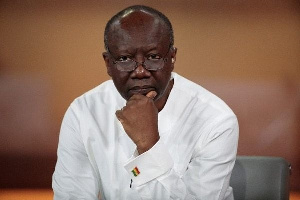 The Minister of Finance, Mr. Ken Ofori-Atta
The Minister of Finance, Mr. Ken Ofori-Atta
The Minister of Finance, Mr. Ken Ofori-Atta, has bemoaned the devastating impact of COVID-19 on the country’s progress towards attaining the Sustainable Development Goals (SDGs) but said measures were underway to make up for the loss.
He said although the country had reported marked progress towards meeting the targets in 2019, the outbreak of the virus in March last year had “set us back significantly.”
He said at the launch of the 2020 SDGs Budget Report in Accra last Thursday, that the pandemic had led to a deterioration in economic growth, with the attendant effects on job losses, inequality in access to education and health services, among others.
Third report
The 2020 report is now the third in the series after a baseline report was released in 2018.
It tracks budget allocations to each of the 17 goals as part of efforts to keep tabs on the country’s progress towards attaining the SDGs.
Among other things, the report gave account of the sources of the funding as well as allocation on regional bases.
COVID-19 effects
Delivering his keynote address at the event, Mr. Ofori-Atta said: “We all know that in 2020, the devastating effects of the COVID-19 pandemic set us back significantly in the progress we had made towards the SDGs. At the time when Ghana was reporting its progress during the United Nation’s (UN) Voluntary National Review in 2019, we reported progress in the following areas: economic growth, education and job creation,” he said.
He, however, explained that since the world was ravaged by the COVID-19 pandemic, these same areas had reported deterioration, including “decline in GDP growth from a projected 6.8 per cent to 0.4 per cent, increasing inequality in access to education, and job losses, especially in the hospitality sector.”
“In 2021, we recognize that the pandemic is not a passing frigate but at least a three-year ice age; and that the full impact of the pandemic on our populations, our societies, and our economies is not over,” he added.
Mitigating measures
In spite of the drawback, the minister said the government was rolling out various initiatives to help contain the effects of the pandemic and make up for the deterioration in progress.
He mentioned the launch of the GH¢100 billion Ghana CARES Obaatanpa initiative, which was a COVID-19 Alleviation and Revitalization Program(CAP) intended to jumpstart the Ghanaian economy through industrialization, digitalization and enterprise development while working with the private sector to inject more private capital into the economy.
He said the CARES program outlined various policy initiatives that aligned national incentives towards accelerating the recovery and structural transformation.
Mr. Ofori-Atta said phase one of the program comprised stabilizing the economy during which the government spent about GH¢8.1 billion to preserve livelihoods.
He said the next was the revitalization and transformation phase and would span between 2021 and 2023 under which there would be a strong focus on industrialization, intra-African trade, and digitalization.
“These focus areas will drive the economic recovery plan over the next three years and provide the fiscal stimulus for economic revitalization to build back better and greener. As a result, we expect to record average GDP growth of five per cent over the medium term,” he added.
Allocations
Meanwhile, the 2020 SDGs Budget Report showed that goal four enjoyed the highest budget allocation while goal six suffered the least funding last year.
While goal four, which aims at attaining quality education, was allocated GH¢5.8 billion last year, goal six, which talks about affordable and clean energy, was given GH¢13.6 million.
On goal four, the report said GH¢ 5.4 billion was allocated at the ministries, departments and agencies (MDA) level, while GH¢ 403 million was apportioned for the MMDAs under last year.
“In total, an amount of GH¢5.8 billion was allotted to goal four in the national budget,” it said, noting that the funds were sourced from the government, the annual budget funding amount (ABFA) from petroleum revenues, development partners, internally generated funds (IGF) and statutory funds.